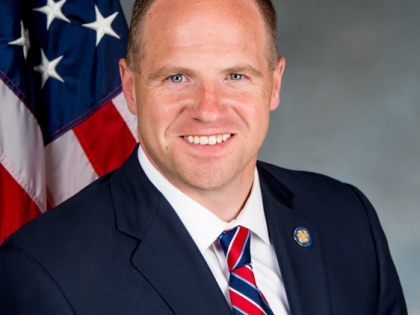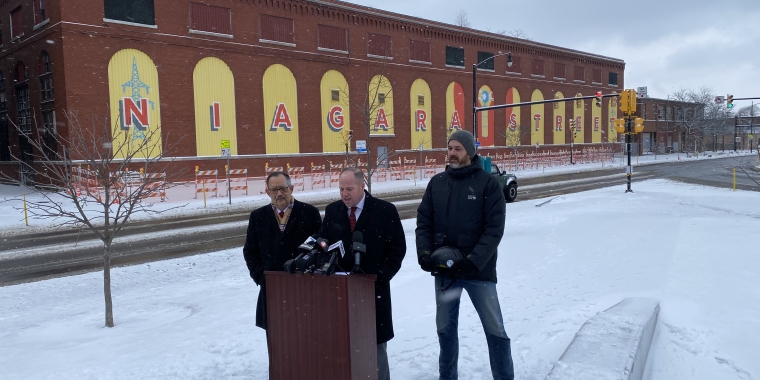
Kennedy, Peoples-Stokes Propose Major Changes to Reform Child Protective Services
Timothy M. Kennedy
January 10, 2014
Following the tragic deaths of two young Buffalo children, Senator Kennedy and Assemblywoman Peoples-Stokes pursue new legislation to improve a system long needing reform.
BUFFALO, N.Y. – Senator Tim Kennedy and Assemblywoman Crystal Peoples-Stokes, both Democrats from Buffalo, today unveiled a comprehensive series of legislation that will strengthen and improve Child Protective Services in Erie County and across the state. Together, the bills proposed by Kennedy and Peoples-Stokes present major changes to a system long in need of reform.
With the legislation they outlined Friday at Women and Children’s Hospital of Buffalo, Kennedy and Peoples-Stokes envision a Child Protective Services system that is more responsive, accountable, transparent and effective. Their proposals include a wide range of sweeping changes, which extend from new interviewing protocols to increased staff qualifications, and from restructured definitions of abuse to deeper and more thorough investigations.
These reforms follow the tragic deaths of two Buffalo children, five-year-old Eain Brooks and 10-year-old Abdifatah Mohamud, which shed light on serious gaps and inadequacies within the system of Child Protective Services locally and statewide. In the days after Eain died in September 2013, family members came forward with details of their numerous attempts to get Erie County Child Protective Services to intervene and stop the abuse Eain was suffering. In 2012, Abdi Mohamud was murdered by his stepfather after Erie County CPS conducted an investigation but did not take any action to remove him from the home.
“The deaths of Eain Brooks and Abdi Mohamud are heartbreaking and intolerable tragedies. As a community and as a state, we must keep children safe from harm and ensure no family ever again has to suffer the pain of losing a child to abuse, especially once that child is in the hands of the system set up to protect them,” said Senator Kennedy. “The state has been aggressive in its work to investigate and improve child protective services in Erie County and across the state. These reforms are the next step.
“With our legislation, we will make Child Protective Services more responsive and accountable, demand investigations are conducted more thoroughly, provide better training and preparation for CPS workers and enhance the effectiveness of the statewide hotline so that children in Erie County and across New York State are kept safe,” Kennedy added. “Children across the state are counting on the State Legislature to take action and help reform the system. We cannot let them down. In Eain’s case, Abdi’s case and many others, the system failed. Our CPS systems desperately need to be strengthened and improved, and our legislation is essential to doing just that.”
“This package of bills presents an opportunity to enact long overdue and much-needed reform to the Department of Social Services and Child Protective Services. Our children’s well-being is our foremost concern; these reforms are intended to close existing gaps and to make the system safer, improve accountability and make it more responsive for our children that need it,” commented Crystal D. Peoples-Stokes, NYS Assemblymember, 141st District.
Under the new proposals from Kennedy and Peoples-Stokes, CPS caseworkers will be required to interview children separately from any individuals named in reports of suspected abuse to allow the child to speak openly and without fear. The lawmakers have proposed new accountability measures that will more deeply involve mandated reporters, like physicians and teachers, in investigations and allow families to determine if appropriate actions have been taken to keep children safe.
Kennedy and Peoples-Stokes want to reclassify excessive corporal punishment, which often involves serious injury to a child, as abuse rather than neglect to ensure cases involving acts of extreme and senseless violence – such as in Abdi Mohamud’s case – receive the higher level of scrutiny and deeper investigations that are generally given to abuse cases. They have also introduced legislation to require more rigorous training and heightened qualifications for CPS workers and supervisors. The legislative package also contains provisions to urge the statewide child abuse hotline to monitor for repeat reports of suspected abuse involving the same child or family, as well as a bill to require the gathering of photographic evidence to ensure home visits are made and the findings of investigations are accurate.
The New York State Office of Children and Family Services continues its efforts to investigate and monitor the work of Erie County CPS. Following Eain’s death, the state quickly answered Kennedy’s call for an investigation into Child Protective Services and began reviewing local cases to ensure children were being kept safe and investigations were being conducted thoroughly. The state has since released its first report from its two-phase review of the practices and procedures of Erie County CPS. The second report is expected within the next several weeks.
Kennedy and Peoples-Stokes said the legislative reforms they’ve proposed were largely informed by input shared at a recent public hearing held at Buffalo City Hall, where the state legislators heard testimony about issues within Child Protective Services.
Child Protective Services Reform Proposed by Kennedy and Peoples-Stokes
- Ensuring Child Protective Services workers are properly trained for their unique and challenging work.
- This legislation enacts new qualification requirements for CPS workers and supervisors.
- CPS caseworkers would be required to have a bachelor’s degree in social work, psychology, counseling, addiction or a related field, or they could have relevant experience in law enforcement, counseling or working with individuals with disabilities.
- CPS supervisors would be required to have a master’s degree in social work, psychology, counseling, addiction or related field, or ten years of relevant work experience in the human services field.
- New accountability by strengthening involvement of mandated reporters in CPS investigations.
- The county Child Protective Services agency will be required to provide information, within 30 days, after receipt of a report of suspected abuse or neglect to the mandated reporter who called in the suspected mistreatment.
- Mandated reporters will be given access to the outcomes of investigations into the safety of children to determine if reports were unfounded, if reports resulted in services being provided to a child, or if reports resulted in a child being removed from an unsafe environment.
- This will ensure families and mandated reporters have necessary information to ensure reports of abuse are taken seriously. Families who stay in close contact with mandated reporters, such as teachers and physicians, will be able to monitor and be assured that necessary actions are being taken to investigate a case.
- Reforming excessive corporal punishment statutes. Ensuring stronger, deeper investigations when violent, extreme and senseless corporal punishment is reported.
- This legislation reclassifies excessive corporal punishment as abuse, rather than neglect, and thus, subjects more CPS cases to further scrutiny to ensure the safety of children involved.
- Abuse cases receive a higher level of investigation, stricter scrutiny and carry more severe penalties than neglect cases. This legislation will ensure cases of excessively violent corporal punishment, like that suffered by Abdifatah Muhamud, are investigated to a fuller, more thorough and more aggressive degree.
- Officials in the fields of child advocacy, child protection, parents’ rights and law enforcement have long been clamoring for a change to this antiquated legal definition. Currently, 33 other states already classify excessive corporal punishment as abuse.
- Reforming protocols for the interviewing of children in suspected abuse cases to ensure stronger, more accurate and more thorough investigations.
- This legislation amends the social services law to state that children, in CPS investigations, may not be interviewed in the presence of another individual who has been named in the report of suspected abuse or neglect.
- This will allow CPS workers to conduct a more thorough and meaningful interview.
- Children interviewed in front of a potential abuser may be coached to say something, or may be fearful of speaking the truth. In this unfortunate circumstance, the abuser may be shielded and the CPS worker may be blocked from acting to protect the child.
- Sharpening the statewide child abuse hotline to track repeat reports of abuse.
- This bill requires the Office of Children and Family Services, which oversees the statewide hotline, to monitor for repeated reports of abuse to facilitate a more appropriate response from local counties to families or children frequently reported to the hotline.
- Under this legislation, OCFS will be required to consider the prior history of reports and allegations of child abuse or maltreatment when making a determination of whether a new allegation could reasonably constitute a report of child abuse.
- This will ensure a report of child abuse is not viewed as an isolated incident when a call is made to the central register, if the child or suspected abuser involved has previously been reported to the register.
- Improving investigations and ensuring accountability by requiring photographic evidence be gathered during caseworker visits.
- This legislation changes the social services law to require that every caseworker or CPS worker who has contact with a child as part of an investigation, a supervision/monitoring program or a treatment plan document each visit with a photograph of the child.
- The photographic evidence will be confidential and maintained in confidential case files to be periodically reviewed by supervisors on the case.
- This will prevent workers from falsifying records, and it will allow caseworkers to more seamlessly consult with supervisors regarding the evidence uncovered that will determine the case’s conclusion.
- In the case of Eain Brooks, photographic evidence may have helped CPS determine that the likely cause of Eain’s injuries did not match the explanations the alleged abuser gave to caseworkers.
###
Senator Timothy M. Kennedy represents the New York State Senate’s 63rd District, which is comprised of the town of Cheektowaga, the city of Lackawanna and nearly all of the city of Buffalo. More information is available at http://kennedy.nysenate.gov.
Assemblymember Crystal D. Peoples-Stokes represents the New York State Assembly’s 141st District which covers a large portion of the city of Buffalo. More information is available athttp://assembly.state.ny.us/mem/Crystal-D-Peoples-Stokes.
Share this Article or Press Release
Newsroom
Go to NewsroomSenator Kennedy 2023 Veteran Hall of Fame
November 10, 2023



Senator Kennedy 2022 Woman of Distinction
August 26, 2022
